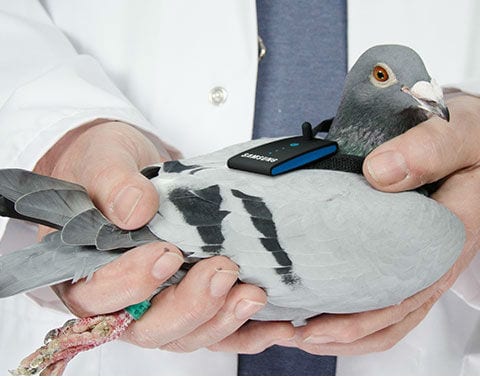
by Pigeon Patrol | Oct 26, 2023 | 4-S Gel Bird repellent, Animal Deterrent Products, Bird Deterrent Products, Bird Law, Bird Netting, Bird Spikes
The politicians are seated in a semi-circle at a meeting of the council. One by one, they raise their voices as part of the deliberation. “I believe it is time we took a position on this,” says a black-blazered woman. “It’s not an industry that I want to support,” a second woman, wearing dark-rimmed glasses, reads into the official record.
“It’s time,” concludes the mayor, donning the heavy chain that is the insignia of his office, “to end the practice in our community.”
It is a fall meeting of the District of North Vancouver’s city council and they are discussing whether people should be allowed to keep pigeons. Councillors Lisa Muri, in the blazer, and Megan Curren, with the glasses, ultimately vote with the mayor in favour of an outright pigeon ban.
Coun. Matthew Bond, one of those who votes against, says skeptically, “I don’t necessarily see this as a good use of our time.” But the bylaw passes, four to two.
Something smells, though. Only one property in the community is known to harbour pet pigeons. Only one complaint about pigeons, dating back several years, is known to be active. Only one city councillor has recused herself from the discussion. “I have been in a situation like this,” Coun. Betty Forbes says, at the same meeting. “So I’m stepping aside.”
One plus one plus one equals . . . a conflict of interest?
Documents obtained by the CBC under access-to-information seem to bolster that view of events. The “situation” was that Forbes lived next-door to pigeons. That she did not like pigeons. And that after complaining to the city as a private citizen to no avail, she took matters into her own hands; after being elected to council in 2018, in an email to two fellow councillors, she requested a bylaw banning residents from keeping the birds.
Emails viewed by Maclean’s suggest that during the spring, Muri initiated a process to change the district’s pigeon ownership rules, and kept Forbes up to date on its progress. But the whole project has since run into trouble because it turns out Kulwant Dulay, Forbes’ neighbour, cares deeply about his pigeons. He cares enough to go to court.
His petition to B.C. Supreme Court, dated Dec. 4, seeks to have the bylaw declared illegal and set aside. It relies heavily on the CBC’s reporting, referencing emails between Forbes and Muri earlier this year that appear to reveal a plot to hatch the bylaw.
Dulay is arguing that Forbes’s involvement was “biased and bad faith and acting in a conflict of interest,” says Camille Chisholm, a lawyer representing the pigeon enthusiast. The district has retained its own lawyers and was expected to respond in January.
The same week as Dulay’s petition was filed, the District of North Vancouver announced it was tasking former B.C. privacy commissioner David Loukidelis with investigating how the pigeon ban came to be. His review, the district announced, will assess the “awareness” of conflict-of-interest rules by councillors. The process is expected to take a couple of months.
Dulay, Chisholm adds, has kept homing pigeons as pets for years—including during his time in India before he immigrated to Canada. “My neighbours in the front and back, everybody loves my pigeons,” says Dulay, adding that other than Forbes’s, he hasn’t had a complaint in 17 years. “Everybody comes to my house and looks at them. It looks cool, them flying around.” Some have names. One is called “Big Boss.” His favourite pigeon is blue and white. He said it always comes to his hand.
Dulay keeps his 15 birds in a coop that’s about as tall as the backyard fence and roomy enough for him to enter and move around. During the warmer months, he lets them out to fly around the neighbourhood, including over other people’s yards. He said they always return.
Lately, he has wondered whether Forbes has a problem with him, not his pigeons. He said she “never talks” to him, and notes that he has never complained about her two barking dogs, though he believes he might have reason to.
His across-the-street neighbour, meanwhile, has spoken in his support. “I’ve had opportunity to go over and see the coop,” Krista Page told council on Nov. 18. ”It is clean. There’s no foul smell. I’ve never met neighbours that keep a tidier driveway and home and everything.” Page noted there have been no complaints from the Dulays’ other next-door neighbour, adding: “I just feel that this is very much a misuse of power.”
Forbes declined an interview request from Maclean’s but insisted in an email that there is “another set of correct facts” to the story. “However, because the mayor has requested an inquiry of all council and himself,” the email added, “I am unable to make any comments at this time.”
Her only public response came at the end of the same meeting Krista Page attended. “If I have erred in any way,” she said, “I assure council and the community that it was done inadvertently and in good faith with my understanding, as a new councillor, of the conflict-of-interest rules.”
Muri echoed Forbes in an email to Maclean’s, saying: “We are currently reviewing the process of this bylaw, so it would be inappropriate for me to comment.” But a response to the petition later filed in court by her lawyers denies the councillor was aware of any interest Forbes could’ve had in a pigeon ban beyond one “in common with electors of the municipality generally.”
The submission argues that neither councillor stood to gain financially from the bylaw and doubles down on the councillors’ position that the ban is legitimate and serves to protect residents from current and future pigeon keepers who might “adversely impact them or their property.”
To some, this is more than a dispute between neighbours. Givo Hassko, who is on the board of the Vancouver Poultry & Fancy Pigeon Association, told council in November he believed this was a test case for corruption in Canadian politics writ large. “If there are no consequences to how council goes to change bylaws here locally or Canada-wide,” he said, “then anyone—anyone—would get a green light.”
Hassko set up a GoFundMe to help with Dulay’s legal fees. At the time of writing, it had raised $700. A single commenter named Wayne, who pitched in $55, offered this input: “It is important that pigeons are not homeless.”
Source
Pigeon Patrol
Pigeon Patrol Products & Services is the leading manufacturer and distributor of bird deterrent (control) products in Canada. Pigeon Patrol products have solved pest bird problems in industrial, commercial, and residential settings since 2000, by using safe and humane bird deterrents with only bird and animal -friendly solutions. At Pigeon Patrol, we manufacture and offer a variety of bird deterrents, ranging from Ultra-flex Bird Spikes with UV protection, Bird Netting, 4-S Bird Gel and the best Ultrasonic and audible sound devices on the market today.
Canada’s top wholesaler for bird deterrent products for twelve consecutive years.
Contact us at 1- 877– 4– NO-BIRD, (604) 585-9279 or visit our website at https://www.pigeonpatrol.ca/
Bird Gone, Pigeon Gone, Pigeon problems, pigeon spikes, 1-877-4NO-BIRD, 4-S Gel, Bird Control, Pigeon Control, bird repellent, Bird Spikes, sonic bird repellent, stainless steel bird spikes, bird spikes Vancouver, Ultra Sonic Bird Control, Bird Netting, Plastic Bird Spikes, Canada bird spike deterrents, Pigeon Pests, B Gone Pigeon, Pigeon Patrol, pest controller, pest control operator, pest control technician, Pigeon Control Products, humane pigeon spikes, pigeon deterrents, pigeon traps, Pigeon repellents, Sound & Laser Deterrents, wildlife control, raccoon, skunk, squirrel deterrent, De-Fence Spikes, Dragons Den, Pigeon, Pigeon Patrol, Pigeons Roosting, Vancouver Pigeon Control, Bird Spikes, Bird Control, Bird Deterrent, Pigeon Deterrent, Surrey Pigeon Control, Pest, Seagull deterrent Vancouver Pigeon Blog, Birds Inside Home De-fence, Pigeon Nesting, Bird Droppings, Pigeon Dropping, woodpecker control, Keep The Birds Away, Birds/rats, seagull, pigeon, woodpecker, dove, sparrow, pidgeon control, pidgeon problem, pidgeon control, flying rats, pigeon Problems, bird netting, bird gel, bird spray, bird nails, bird guard, Pigeon control, Bird deterrents, Pigeon deterrents, Bird control, solutions, Pigeon prevention, Pigeon repellent, Bird proofing, Pest bird management, Pigeon spikes, Bird netting, Humane bird control, Bird exclusion, Urban bird control, Anti-roosting devices, Pigeon removal, Bird barriers
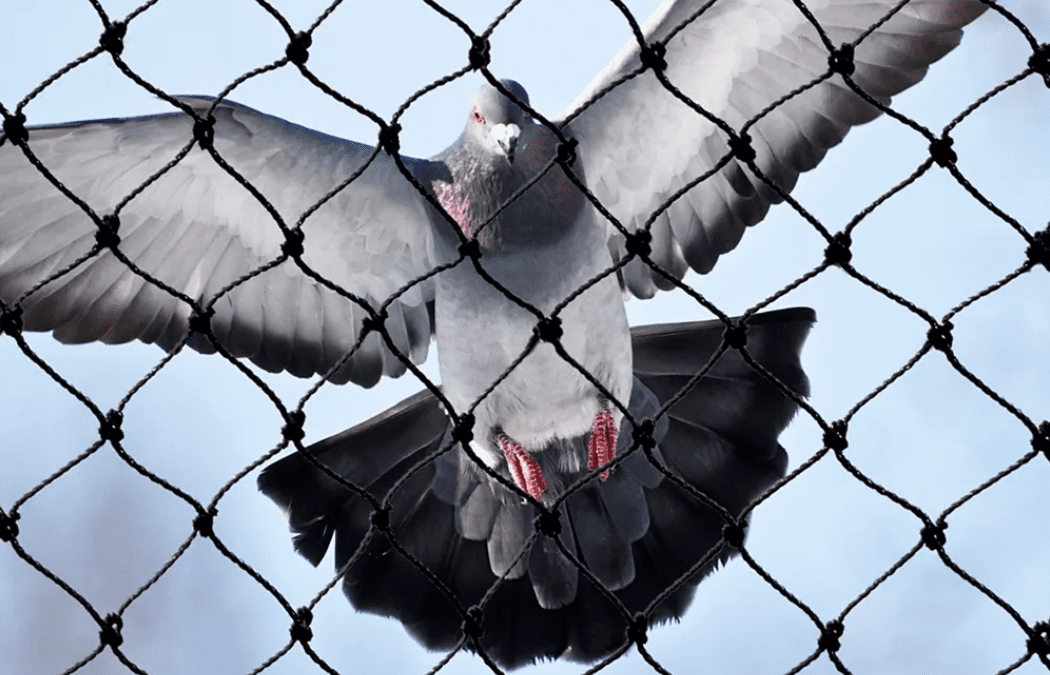
by Pigeon Patrol | Feb 24, 2021 | Bird Deterrent Products, Bird Netting, Bird Spikes, Doves, Pigeon Control, Pigeon Spikes
![Building Product: No Knot Bird Netting - [10203b8] | ARCAT](https://www.arcat.com//photos/birdbgon/132024.jpg)
Why You Should Get Bird Netting
Are you a business owner or property owner that has a bird problem on your premises? Then this is the blog for you!
Here are reasons you should get bird netting!
Bird netting is set up to prevent birds from reaching certain areas, encouraging them to move on to an easier roosting place. Netting can keep birds off windowsills, rooftops, away from your ventilation and roof top air conditioning units. It can take a professional to know just where to place the netting so that it will be the most productive and the least noticeable for customers.
The benefits of using Bird Netting?
- Netting is a great solution against pretty much any type of birds, especially the likes of pigeons and gulls, sparrows and starlings, who are known to cause problems
- Bird netting is highly versatile and can be fitted to pretty much any size that you need to cover
- Bird netting protect structures
- Netting is environmentally safe and can withstand a wide range of environmental conditions
- Netting can last many years
- Netting is virtually invisible when installed correctly
Bird netting or anti-bird netting is a form of bird pest control. It is a net used to prevent birds from reaching certain areas.
Bird protection netting comes in a variety of shapes and forms, The most common is a small mesh (1 or 2 cm squares) either extruded and bi-oriented polypropylene or woven polyethylene.
The color most used is black (as the carbon black UV inhibitor offers the best protection against solar rays), but also bird netting may be available in other colors like white (usually white netting is woven or knitted and has an even smaller mesh size as it will serve as a double purpose anti-hail net for the protection of fruits during summer hail storms or late spring during flowering) or green (usually used in home gardening and mostly sold at retail outlets for the DIY farmers).
Source
Pigeon Patrol Products & Services is the leading manufacturer and distributor of bird deterrent (control) products in Canada. Pigeon Patrol products have solved pest bird problems in industrial, commercial, and residential settings since 2000, by using safe and humane bird deterrents with only bird and animal friendly solutions. At Pigeon Patrol, we manufacture and offer a variety of bird deterrents, ranging from Ultra-flex Bird Spikes with UV protection, Bird Netting, 4-S Gel and the best Ultrasonic and audible sound devices on the market today.
Contact us at 1- 877– 4– NO-BIRD, (604) 585-9279 or visit our website at www.pigeonpatrol.ca
Pigeon / Pigeon Patrol / Pigeons Roosting / Vancouver Pigeon Patrol / Bird Control / Surrey Pigeon Control / Pest / Vancouver Pigeon Blog / Birds Inside Home / Pigeons in the cities / Ice Pigeons/ What to do about pigeons/ most common types of sparrows , Damages Caused by Sparrows, How To Keep Raccoons Away, Why Are Raccoons Considered Pests?de-fence, Pigeon Nesting and Breeding Patterns and Behavior What Do I Do With a Bird Trapped in My Wall? Professional Bird Control Company Keep The Birds Away From Your Business Why Are Raccoons Considered Pests?

by Pigeon Patrol | Feb 9, 2021 | Animal Deterrent Products, Bird Deterrent Products, Bird Law, Bird Netting, Bird Spike, Bird Spikes, Pigeon Patrol's Services, Pigeon Spikes, Pigeons, UltraSonic Bird Control
Bird control technicians’ nightmare – what to do when we are asked to do the impossible? The straight answer is that there is really nothing we can do when pigeons land on your roof, but there is much more to know.
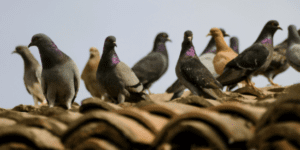
Many customers ask: “Why? Why my roof, what’s so special about my roof that they have to land there?” Believe it or not you are asking the right question: Why? Once you understand why, you will also understand why is it hard to provide a solution in this situation.
Almost always, the primary cause of such problem is the availability of food nearby, plenty of it on a regular basis. Probably someone is feeding the birds or there are lots of garbage in the area or open garbage bins/containers. They could also nest or roost in close proximity and simply they use your roof as a comfy perching spot having a nice vantage point over their feeding area.
What could we do? Install hundreds of feet of spikes on your roof? Put up scary owls? Maybe speakers on the roof peak? Unfortunately none of them are viable. It is simply not feasible to protect large, flat (horizontal or sloped) roof surfaces, such as the entire roof of a victorian house for example.
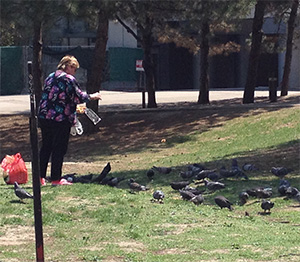
Lady feeding the pigeons in College Park – every day.
First, we need to find ways of eliminating food and water sources nearby. Then we must find their nesting/roosting areas – which will most likely be on another property, otherwise you would see them somewhere else on your house/building, (in which case it would be very easy to resolve the issue,– that provides sheltered structural configurations to establish a protected area where they can stay at night. Pigeons don’t see well at night and usually they go to their roosting spots before nightfall and stay there during the night.
If protecting these areas are not possible (because they are on someone else’s property) we can look at strategically installing Bird Spikes or exclusion Bird Netting or the combination of both, maybe Electric Tracks at critical areas to discourage them from landing on your roof.
You can see now that there aren’t any straightforward solutions in the case of house roof tops and that it is very time consuming to address the issue holistically. The best thing you can do is to call up a professional and get an opinion, you might have missed something that a pro will notice that could help resolve the issue.
source
Some other options for bird repellent would be the Ultrasonic Sound Repellent which makes noises that can only be heard by pigeons and scare them off with the sound or the laser beam which can be activated by movement or you can time when these lasers come on. These lasers are too strong for the pigeons vision to handle and they will fly elsewhere. You can purchase these here : https://www.pigeonpatrol.ca/product/laser/
Pigeon Patrol Products & Services is the leading manufacturer and distributor of bird deterrent (control) products in Canada. Pigeon Patrol products have solved pest bird problems in industrial, commercial, and residential settings since 2000, by using safe and humane bird deterrents with only bird and animal friendly solutions. At Pigeon Patrol, we manufacture and offer a variety of bird deterrents, ranging from Ultra-flex Bird Spikes with UV protection, Bird Netting, 4-S Gel and the best Ultrasonic and audible sound devices on the market today.
Contact us at 1- 877– 4– NO-BIRD, (604) 585-9279 or visit our website at www.pigeonpatrol.ca
Pigeon / Pigeon Patrol / Pigeons Roosting / Vancouver Pigeon Patrol / Bird Control / Surrey Pigeon Control / Pest /
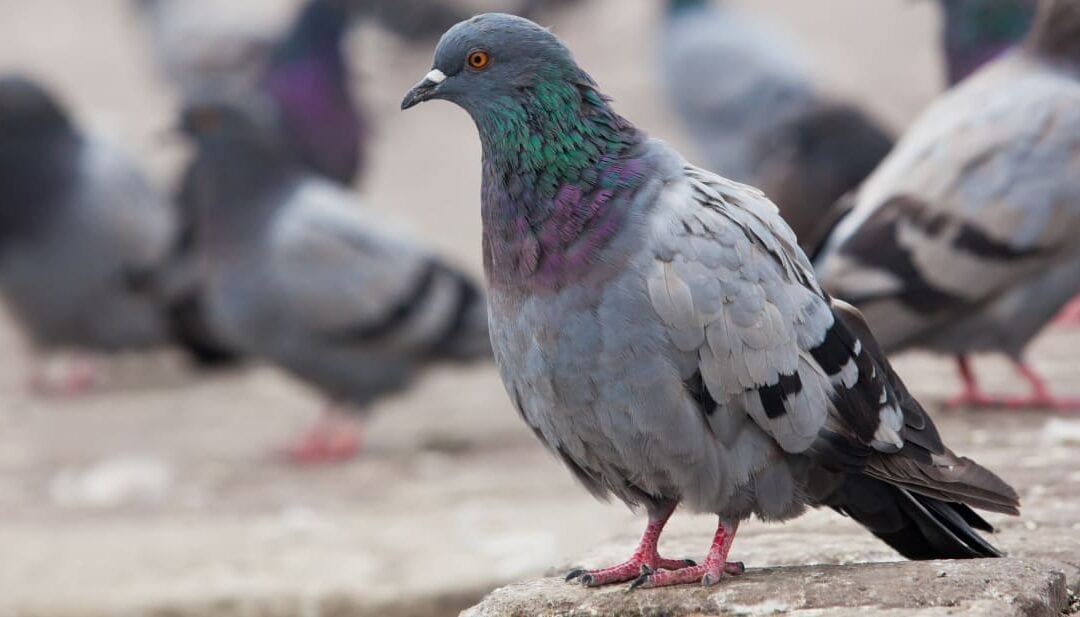
by Pigeon Patrol | Feb 9, 2021 | Animal Deterrent Products, Bird Deterrent Products, Bird Spikes, Columbidae, UltraSonic Bird Control
Sound Deterrent For Birds
Ultrasonic pigeon & bird scarers are electronic devices that produce high pitch emissions known as ultrasound. Ultrasonic pigeon & bird scaring systems have been introduced into the pest control marketplace due to the fact that ultrasound is too high-pitched for human hearing but falls within the hearing range of most species of birds. Most sonic bird scaring devices produce a sound that is audible to the human ear and therefore may cause human disturbance if used in an area of human habitation.
Pest birds can quickly become a costly problem to property owners and managers. The birds will gather in increasingly large flocks to deface and damage property and equipment. Lethal means of bird control—poisons, pellet guns and inhumane traps—are illegal in many areas, since many birds are protected by law. Today’s advanced sound bird deterrents can be highly effective as a humane way to deter pest birds.
How It Works
Ultrasonic repellents work differently than other deterrents. They use high frequencies (which the human ear cannot hear) to deter birds and other pests. When the birds or pests hear the sound being produced, they become disoriented or irritated by the noise. Birds also quickly learn to avoid areas where they have felt the ultrasonic sound waves
There are many ultrasonic devices to choose from depending on the coverage you need. Typically, they are able to cover up to 3,600 sq. ft. With multiple speakers, you can customize coverage for even larger areas.
Distress & Predator Calls Intimidate Birds
Many types of birds such as pigeons and seagulls have a specific “distress call.” Birds will emit these sounds only when they are attacked by a predator. Sound bird deterrents intimidate pest birds by broadcasting these prerecorded distress and predator calls. The devices have been scientifically designed to fully exploit a bird’s natural alertness and sensitive hearing—hearing that’s similar to humans. Social and aggressive birds that communicate verbally within colonies will often fly towards theses distress calls to see if they can mob the predator and come to the aid of their fellow bird. When the calls temporarily cease and no predator is found, the arriving birds are frightened by the possible danger and disperse.
The Sounds Bird Hear
Sound bird deterrents operate within the normal hearing range of most birds—about 1 to 4 kHz—although birds can hear higher and lower frequencies to a limit of 20 kHz. Unlike the ultrasonic sounds emitted by some high frequency “bird deterrents,” the sounds emitted by sound bird deterrents resemble normal birdcalls to the human ear, which is why they won’t annoy pets or neighbors—only birds.
Programmable Output
Birds, like people, can get accustomed to sounds, even those they may initially perceive as threatening. This is why the best sound bird deterrents can be programmed to emit threatening birdcalls for several minutes, stop and then repeat the sequence every 10 minutes. These devices will also feature a volume control that allows the sound intensity of birdcalls to be adjusted—from 65-105 decibels.
Different Sounds for Different Birds
The best sound bird deterrents will have the flexibility to broadcast distress and predator calls for as many as 24 different types of birds. These systems allow users to target a specific bird or all birds. Such systems can even be programmed to turn on and off automatically. They will also allow additional speakers to be added to extend the effective deterrent range from one acre to five acres. source
Pigeon Patrol Products & Services is the leading manufacturer and distributor of bird deterrent (control) products in Canada. Pigeon Patrol products have solved pest bird problems in industrial, commercial, and residential settings since 2000, by using safe and humane bird deterrents with only bird and animal friendly solutions. At Pigeon Patrol, we manufacture and offer a variety of bird deterrents, ranging from Ultra-flex Bird Spikes with UV protection, Bird Netting, 4-S Gel and the best Ultrasonic and audible sound devices on the market today.
Contact us at 1- 877– 4– NO-BIRD, (604) 585-9279 or visit our website at www.pigeonpatrol.ca
Pigeon / Pigeon Patrol / Pigeons Roosting / Vancouver Pigeon Patrol / Bird Control / Surrey Pigeon Control / Pest /
Sound Deterrent For Birds
Vancouver Pigeon Blog / Birds Inside Home / Pigeons in the cities / Ice Pigeons/ What to do about pigeons/ most common types of sparrows , Damages Caused by Sparrows, How To Keep Raccoons Away, Why Are Raccoons Considered Pests?de-fence, Pigeon Nesting and Breeding Patterns and Behavior What Do I Do With a Bird Trapped in My Wall? Professional Bird Control Company Keep The Birds Away From Your Business Why Are Raccoons Considered Pests? Sound Deterrent For Birds
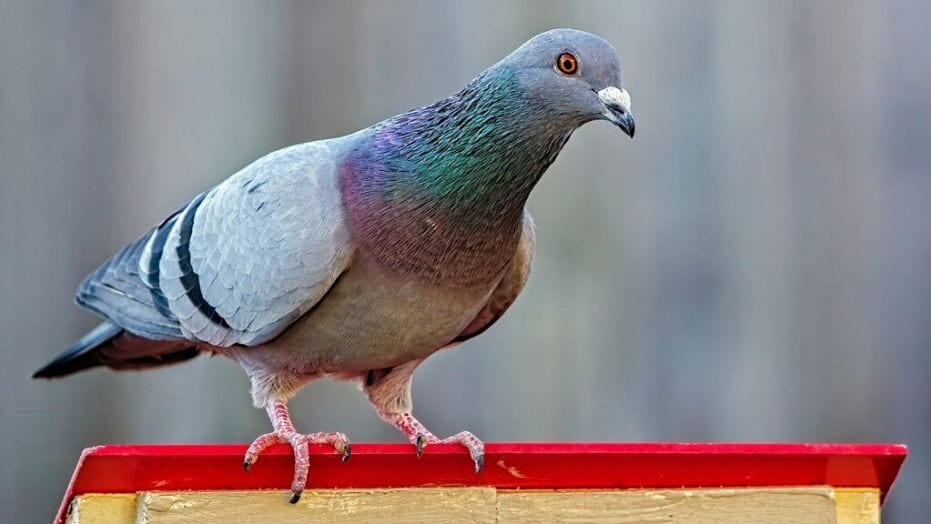
by Pigeon Patrol | Feb 9, 2021 | Bird Law, Bird Netting, Bird Spike, Bird Spikes, Columbidae, Pigeon Patrol's Services, Pigeon Spikes
If you’re looking for the answer to the question “do anti bird spikes reduce pest bird problems?”, then you undoubtedly already have a problem with bird control. Birds are either landing or nesting on your property.
So lets see if bird spikes really work!
You need to look at why the birds are landing and possibly building a nest. Is it because you feed wild birds and other unwelcome species, such as feral pigeons or starlings, are having the lion’s share? Birds go to places where food is most abundant and easy to take. If you want to control what birds you attract to your garden, especially smaller ones, but not pigeons and starlings, make sure you only place food in feeding containers that make it virtually impossible for the larger birds to feed from. If there’s no readily available food, these larger birds will move on to somewhere else.
Secondly, if you have a bird control problem with the smaller birds then anti-bird spikes may not be effective in preventing them from landing and nesting. If you think about it logically, the smaller birds have feet which are designed to grab hold of small branches and twigs – spikes can give them this ideal landing perch.
However, larger birds, such as seagulls and pigeons don’t have feet adapted for landing on fine spiky branches and twigs and therefore anti bird spikes can be a very effective deterrent. If there are a vast numbers of birds, their droppings have been known to build-up on and around the spikes which then forms an ideal platform for them to build nests. SOURCE
Conclusion:
Anti-bird spikes can reduce pest bird control problems if you’re trying to humanely deter larger birds from landing or nesting. On the other hand, the spikes may be the ideal conditions for smaller birds; so you need to take a multi-faceted approach to control unwanted birds from making your property their home or landing site.
Do bird spikes hurt the birds? Bird and pigeon spikes do not hurt birds, they act as a visual and physical barrier. Bird spikes are a humane bird deterrent as the bird doesn’t come into direct contact with the bird spikes.
Pigeon Patrol Products & Services is the leading manufacturer and distributor of bird deterrent (control) products in Canada. Pigeon Patrol products have solved pest bird problems in industrial, commercial, and residential settings since 2000, by using safe and humane bird deterrents with only bird and animal friendly solutions. At Pigeon Patrol, we manufacture and offer a variety of bird deterrents, ranging from Ultra-flex Bird Spikes with UV protection, Bird Netting, 4-S Gel and the best Ultrasonic and audible sound devices on the market today.
Contact us at 1- 877– 4– NO-BIRD, (604) 585-9279 or visit our website at www.pigeonpatrol.ca
Pigeon / Pigeon Patrol / Pigeons Roosting / Vancouver Pigeon Patrol / Bird Control / Surrey Pigeon Control / Pest / Vancouver Pigeon Blog / Birds Inside Home / Pigeons in the cities / Ice Pigeons/ What to do about pigeons/ most common types of sparrows , Damages Caused by Sparrows, How To Keep Raccoons Away, Why Are Raccoons Considered Pests?de-fence, Pigeon Nesting and Breeding Patterns and Behavior What Do I Do With a Bird Trapped in My Wall? Professional Bird Control Company Keep The Birds Away From Your Business Why Are Raccoons Considered Pests? BIRD SPIKES WORK 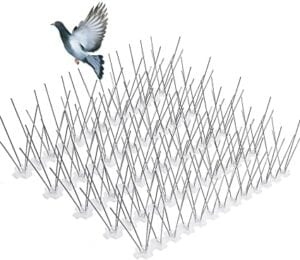

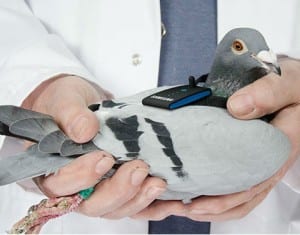


![Building Product: No Knot Bird Netting - [10203b8] | ARCAT](https://www.arcat.com//photos/birdbgon/132024.jpg)





